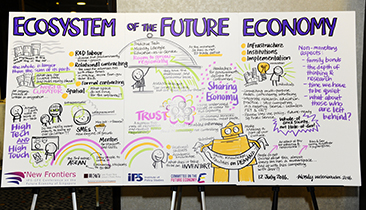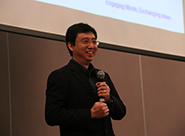In the Spotlight

Charting new frontiers for Singapore’s economic future
IPS co-organised a conference with the Committee on the Future Economy (CFE) last week to gather insights and ideas on the trends that will define Singapore’s future economy. Experts from academia, the private sector and business associations gave wide-ranging views on the industries that will potentially define the future, ecosystems that will support it, skills building and education, strategies to spur innovation, and much more.
Features

IPS Corporate Associates Breakfast with Tan Chade-Meng
Over breakfast last month, New York Times best-selling author Tan Chade-Meng spoke to IPS Corporate Associates about harnessing emotional intelligence for success at the workplace. The discussion ranged from correlations between success and happiness, to how compassion affects leadership, and the difference between harnessing happiness, over anger, to achieve social justice.
Views

Singapore governance in a troubled post-Brexit world
By Gillian Koh
A sense of social insecurity and ambivalence towards immigration shaped the vote in the Brexit referendum. Singapore is also not immune to rising disillusionment with globalisation, especially in times of economic crises. However, a “fortress mentality” has no place here. Transnational challenges can be addressed through deliberate, collective action.

Solving Asia’s water woes by 2030
By Tommy Koh
Asia faces several challenges in achieving the UN’s goal of safe and affordable drinking water for all by 2030. What’s needed is political will, good governance and sound water policies.

The paradox of strong family ties in the integration of immigrants
By Eugene Teng and Leong Chan-Hoong
Findings from the 2012 IPS survey on Social Markers of Integration suggest that strong family bonds may not necessarily facilitate a more inclusive attitude towards foreigners. How then to improve the level of trust towards “outsiders” without weakening family ties?

Why I think the EU will survive
By Tommy Koh
Euroscepticism has had its important supporters in Singapore, but Ambassador-at-large Tommy Koh believes the contrary. He believes that the EU will survive because it is a political and economic success, and that the EU will grow stronger despite the outcome of the UK’s EU referendum. Nonetheless, he warns that leaders of the EU should be concerned that public opinion throughout Europe has turned against the EU and its commission in Brussels.
Upcoming
Action Plan Singapore
Date: 04 August 2016
IPS is organising its 2016 scenario-planning project called “Action Plan Singapore”. The question it addresses is “What will Singapore’s socio-economic landscape be in 2026?” The project focuses on three areas that are critical to the future of Singapore: Longevity, Innovation and Skills.
IPS in the News
For coverage of New Frontiers: IPS-CFE Conference on the Future Economy of Singapore, click here
For Soundbites, click here
For media coverage of IPS seminars and lectures, click here
Copyright 2016 by Institute of Policy Studies. All Rights Reserved. Best viewed with IE 7.0 and above in 1024 by 768 pixels.